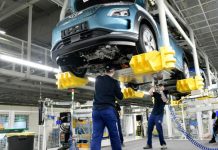Vietnam is preparing for a greener economy by collaborating to enhance human resource training and equip workers with the skills to adapt to changes in the job market.
In late September, a delegation of 17 Australian educational institutions and organisations visited Vietnam to explore cooperation in areas where Australia excels, such as agriculture, energy transition, and manufacturing.
Binh Nguyen, manager of Strategy and Partnerships for Southeast Asia at the University of Queensland, expressed a desire to establish partnerships with various educational institutions in Vietnam following the visit.
“We can support Vietnam’s green transition through training and research collaborations with key universities and research institutes in Queensland. This includes short-term programmes to enhance the green skills of senior officials,” Nguyen said.
Rebecca Ball, senior trade and investment commissioner at Austrade, said, “Australia’s expertise in green technologies, sustainable practices, and clean energy solutions will play a crucial role in supporting Vietnam’s workforce development and green economy transition.”
The country’s general strategy aims for net-zero emissions by 2050, focusing on reducing greenhouse gases, increasing the use of renewable energy, and promoting sustainable urban development. According to the Ministry of Labour, Invalids and Social Affairs, the transition is expected to create nearly one million new jobs by 2040.
The General Statistics Office (GSO) reported that green jobs currently account for 3.6% of total employment in Vietnam. Sectors such as electricity, gas, and water supply have the highest concentration of green jobs, at about 23%, while mining and market services account for 5% each.
The GSO also forecasts that the green economy will create around 90 new occupations, doubling the current number and comprising over 40% of total employment. The Red River Delta, Mekong Delta, North Central, and Central Coastal regions are expected to have the highest concentration of green jobs.
Globally, the transition to a green economy and net-zero commitments have led to rising demand for related jobs. According to the Greening World of Work 2023 Outlook report by Manpower Group, approximately 30 million new jobs will be created globally by 2030 due to such development. However, 91% of companies in the Asia-Pacific region are facing a shortage of skilled personnel for the transition.
The 2023 Global Green Skills Report by LinkedIn reveals that demand for workers with such skills is increasing, but the market faces a shortage of capable labour. Between 2022 and 2023, the recruitment rate for workers with at least one green skill doubled to 22.4%, while workers with such skills accounted for only 12.3% of the workforce.
In response, several Vietnamese universities have begun integrating these skills into their curricula to address the workforce demands of this transition.
Dong Van Ngoc, principal of Hanoi College of Electro-Mechanics said, “Green skills training programmes will be incorporated into our courses, with priority given to renewable energy, wind and solar energy, automation, and 4.0 technology in agriculture.”
Similarly, the School of Electrical Engineering at Hanoi University of Science and Technology is enhancing its programme in Electrical Systems and Renewable Energy to be at the forefront of the green transition.
Assoc. Prof. Nguyen Duc Huy, deputy principal of the school, said, “Large companies such as Vietnam Electricity and foreign firms from Japan are collaborating with the university in training processes. Partnerships between businesses and training institutions are crucial, and this collaboration will create balanced development and play a crucial role in promoting sustainable growth in people. Our vision is to train high-quality personnel, not just for Vietnam, but to supply the world.” – Vietnam Investment Review





















